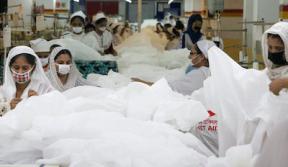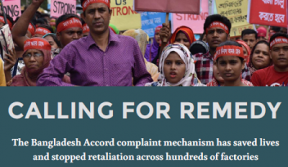Retail operations run by the U.S. government are buying clothing from unsafe and abusive factories in Bangladesh without investigating the working conditions, according to a new report published today by Washington, DC-based International Labor Rights Forum. In relying on factories’ own unverified claims of compliance with labor law or the audits of companies such as Walmart and Sears—audits that have persistently failed to protect workers from fires and building collapses—the exchanges are, in effect, “flying blind” the report argues.
The 50-page ILRF report, “Dangerous Silence: Why the U.S. Military Exchanges Need to Address Unsafe and Illegal Conditions in Their Supplier Factories,” (http://laborrights.org/dangeroussilence) also shows that in some cases U.S. military exchanges cut off relationships with suppliers when presented with evidence of violations, leaving workers behind in potential deathtraps. The exchanges sell about $1.5 billion of apparel and footwear annually, 90% of which is from overseas factories. They operate more than 1,100 retail stores on military installations in all 50 states and more than 30 countries around the world.
“In a year when the tragedies at Rana Plaza and Tazreen Fashions have spurred both governments and private retailers and apparel brands to take action for a safer Bangladeshi garment industry, retail operations run by the U.S. government can’t sit on the sideline,” said Judy Gearhart, executive director of the International Labor Rights Forum. “The federal government needs to own what’s going on in its supply chain and not rely on Walmart, Sears or other industry audits.”
According to the ILRF report, the U.S. military exchanges often remain ignorant of flagrant violations in their supplier factories, because the industry audit reports failed to disclose them. In other cases, the military exchanges have knowledge of severe safety and labor rights violations in their supplier factories but do not inform workers or Bangladeshi authorities of their findings or require that the factories fix the problems. “They ignore perils to workers’ safety and rights,” the report states.
“As large buyers and as agents of the U.S. government, the U.S. military exchanges have an obligation and an opportunity to define a new standard for social responsibility in their supply chains,” said Bjorn Claeson, senior policy analyst at International Labor Rights Forum and author of the report. “Last month, in the Defense Appropriations Act, the US Congress praised the Marine Corps for requiring licensees to join or comply with the Bangladesh Safety Accord and urged the rest of the Armed Forces to adopt the same standard. Now it’s time to put that recommendation into action.”
The publication of Dangerous Silence comes a day after a U.S. Senate Committee on Foreign Relations hearing, “Prospects for Democratic Reconciliation and Workers’ Rights in Bangladesh.” Kalpona Akter, executive director of the Bangladesh Center for Worker Solidarity, testified at the hearing and Reba Sikder, an 18-year old survivor of the Rana Plaza building collapse submitted on-the-record written testimony. Sikder is the first survivor of Rana Plaza to travel to the U.S. She is in the U.S. on a speaking tour organized by United Students Against Sweatshops.
“My life has been so incredibly hard in the last year and my heart breaks even more for all the other workers and families affected by the Rana Plaza building collapse. Because of the accident, I no longer have any hopes or dreams for the future like I did before. I would like to ask the US government to help ensure that the brands – including the American companies Children’s Place, JCPenney, Cato Fashions and Walmart – that benefited from the work of my colleagues and me pay us full and fair compensation. Please think about the workers who have lost their limbs, their feet and their hands, and about the families who have lost their sons and daughters, wives and husbands. Please think about their pain and how they are forced to live. I would also urge the US government to tell American brands to sign the Accord on Fire and Building Safety in Bangladesh. This is the only way to prevent future workers and their families from suffering the same tragedy that I have experienced,” Sikder says in her testimony.

